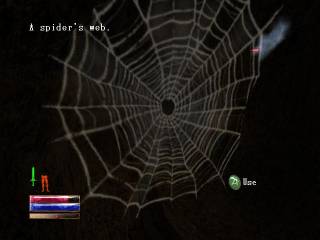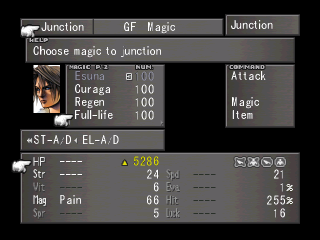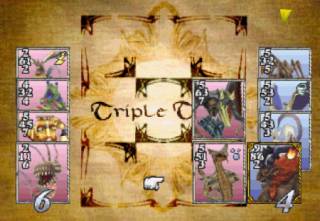A Web of Resources: Character Building in Final Fantasy 8
By thatpinguino 30 Comments
Final Fantasy 8 is the first game that I ever bought with my own money. At 8 years old (way too young to play that game by the way) I was exposed to one of the most open, complex, and unintuitive combat systems that I have ever seen in a main stream rpg… and I have been toying with it ever since. It seems to me that Final Fantasy 8’s combat and character development systems are pretty fundamentally different from the average rpg on a philosophical level. Final Fantasy 8 rewards clever use of game mechanics like every good game should, but where it differs from other rpgs is its punishment of grinding and the non-linearity of its character development. Almost all rpgs in some way force or reward grinding; they intentionally throw random encounters at you or construct bosses in such a way that they can be beaten with skill or with the brute force approach. Either figure out how to actually beat the boss or level up to the point where the boss is no longer a threat. Levels equal power and your characters fit somewhere on a difficulty curve based on their level. However, in Final Fantasy 8, purely sinking time into your characters by fighting random encounters or hoarding resources is actively punished by the game and early on the player has access to an Enc-None ability that removes random encounters entirely. Thus, from the start of the game, rather than rewarding or forcing grinding, a clever management of magic, items, and time is rewarded in the form of stronger characters, easier battles, and more varied gameplay.

You see character growth in Final Fantasy 8 is almost completely removed from typical rpg design conventions. Things like your character’s level, weapon, and even their identity matter very little in the grand scheme of combat. Each character in the game begins as a largely blank slate, so much so that characters without junctioned GFs can only attack and perform limit breaks, they have no access to magic or summons or items. This design decision forces players to carefully select and assign GFs to each character to maximize their effectiveness. Each GF confers a number of different abilities and bonuses to the character to which it is junctioned; these abilities range from small bonuses like hp +10% and str +20%, to more customization options like the ability to augment a character’s vitality and magic stats by fortifying those stats with magic. Junctioned GFs can also provide a character with combat abilities like Item, Recover, and Revive which cost nothing and prove to be incredibly useful to the player. By providing the player with a bunch of blank canvases for characters and a variety of paints in the form of GFs, Final Fantasy 8 largely allows the player to decide the combat roles of every character in the game from the moment the game starts. How you allocate the game’s finite number of GFs determines the fundamental makeup of your characters and, since GF junctioning and magic acquisition are not permanent, the game encourages tweaking with junctions and party configurations to find interesting and useful combinations.
Final Fantasy 8 also does away with many of the benefits that a traditional leveling system provides. Although, some stat bonuses are applied whenever a character levels up, those bonuses pale in comparison to the stat boosts that the game’s junction system can confer. This is especially true when considering that the game’s monsters scale based on the level of your party, meaning that out leveling your enemies is never an option. If you do not exploit the junction system in some way you will find that the enemies become quite challenging as the game wears on. I thought during one play-through that I would try grinding out some levels early on to see how well the game’s scaling balanced the enemies. I found that even some of the more common enemies became a problem as the game scaled them. I tried to level my way past enemies and it did not work, I started to have party members knocked out by random encounters; bosses that were cake walks became game over screens. I abandoned that play-through at the end of disk 1 as I found that without really diving into the junction system the game really became a slog and a chore. Over-leveling my characters was in fact the worst thing I could have done. Instead, I have found it vastly more rewarding to keep my party members under-leveled and instead use the junction and GF systems to do the work that hours of combat would do in other games.

Now what exactly does junctioning entail? Put simply, junctioning allows for the player to boost the stats of characters by fortifying things like strength, hp, vitality, and elemental resistances with magic to either boost stats or create an elemental or status strength. You see magic is not a series of spells that drain a pool of mp when they are used, rather magic is treated as an accruable resource that can be acquired and spent, much like money is in most games. Every spell can be cast by every character and up to 100 uses of a given spell can be stored up for use in combat and for junctioning. For example, junctioning a spell like Protect to a character’s vitality will provide a substantial boost to that character’s vitality, the more uses of the protect spell that a character has the higher the stat boost. This leads to every spell being valuable not only for their effects when used in combat, but also for their value in character building. Also since many of the most useful spells are also great for junctioning there is always a balance between using spells in combat and hoarding them to keep your character’s stats up. Magic can be moved freely between characters and even entire character load-outs can be exchanged at will. This creates an open system of character development that encourages experimentation at every step of the game: no character is ever too under-leveled to contribute and you never have to worry about a character’s equipment. All it takes to make a character viable is redistributing some magic and GFs and viola.
What fuels the junction system is a series of exploitable resources that the player has at their disposal. I use the word resources because I believe that although the resources I’m about to describe are all fairly unique and different entities in other games, in Final Fantasy 8 all of these resources can be converted in some way into either a usable item or magic that can be used in character development. In Final Fantasy 8 things like items, cards, and even enemies can be converted into stat boosts or abilities, largely by being converted into magic.

The first resource I want to investigate is enemies. Magic can be drawn infinitely from enemies, and bosses often have GFs that can be drawn from them. This puts a premium both on knowing your enemies as well as not killing them. Since each character can hold 100 uses of a spell and magic can be drawn infinitely from enemies, it is actually more useful to fight one group of enemies until you can find out what magic they carry, as well as stock up on important spells, than to run through them. Simply killing enemies in Final Fantasy 8 is not hard by and large; however, staying alive against the strongest enemies in the game in order to draw magic from them is. This creates a whole other layer to the combat that is not there in most other rpgs. There are always two goals in Final Fantasy 8, getting to the next fight and mining the current fight as long as possible. This is further emphasized when characters gain the mug and devour abilities; from that point on enemies are not just a source of magic and experience, but they are also a constant source of items and even stat bonuses, if you devour or mug the right enemy. Enemies are less of an obstacle in Final Fantasy 8 and more a renewable resource to be exploited.
Another primary source of magic and items in Final Fantasy 8 is the card game Triple Triad and the refining abilities possessed by many GFs. Many of the GFs that the player can acquire over the course of the game have abilities which refine items into magic or other useful items. The GF Quezacotl also allows players to convert cards from Triple Triad into a variety of useful items, which can then be converted into magic or used. My favorite example of how important this source of magic can be is the card Abyssal Worm; it can be won from several npcs about one hour into the game and there is no limit on how many copies of the card you can win from one opponent (I guess semantically there is a 100 card limit for each card but I have never hit it and to do so would be a huge waste of time). This card can be refined into a windmill, an item that is relatively useless; however, that windmill can be refined into 20 uses of the spell Tornado. Tornado is one of the strongest junctioning spells in the game and with 100 uses of it junctioned to any offensive stat or to the hp stat, less than 3 hours into the game, one of your characters can either be strong enough to one shot most random enemies or have life that is so high that their max hp is 5 or 6 times higher than it would be without junctioning. Every card in the game can be refined in a similar way, and although not all of them have such a dramatic effect on gameplay as this example, the fact that you can acquire the building blocks for your characters (rather than some weapons or special magic) from a mini-game rather than through combat is really remarkable. Truthfully, exploiting the card game and using cards as disposable resources allows you to far outpace the rate of character growth that simply playing through the main story allows.

Even if you do not get into the card game there is still a wealth of items that can be refined into powerful magic in Final Fantasy 8. As I mentioned earlier, items can be obtained by mugging enemies or they can be found as drops after a battle. Items can also be bought and sold using gil; however, even gil does not behave like ordinary currency in this game. Gil is paid to your party at a steady rate over the course of the game in the form of a salary. You do not get any money from killing enemies and the dropped items in the game sell for such small amounts that they are by and large not worth selling. On top of restricting the amount of money the player has available, there are not many stores in Final Fantasy 8 to spend money at. There are a hand full of book stores and pet shops to shop at, as well as some general stores, but most of the goods for sale are either one time purchases like books or utility items like potions and phoenix down. This lack of items as well as the throttling of money available to the player largely makes stores useless or at the very least their importance is greatly reduced compared to the ordinary rpg store. Though money is an asset that can be used, it is just that, an asset. Hoarding huge piles of money does not help you in Final Fantasy 8 any more than huge piles of experience do.
Final Fantasy 8 is so interesting to me because it turns many of the ordinary rpg conventions on their heads. It creates a situation where mindlessly bashing your head against mobs of enemies to accrue larger sacks of gold and shinier loot largely means nothing. To hoard in Final Fantasy 8 is to waste resources and to waste time. At the end of the day, piles of experience only makes enemies harder, piles of money can only be spent on useless items, even piles of items can only be refined so many times. Each character can only have 100 uses of a given spell, and since there are only 3 characters in your party at a given time you really only ever need 300 uses of a spell. If you have hoarded 30 windmills with the hope of making your party invincible then you wasted your time, 15 windmills would have been enough to max out all three members of your party and now the other 15 are virtually useless. Final Fantasy 8 is a game of resources and a game of balance, every resource is incredibly valuable to a point, but, once you cross a certain threshold, excess resources become useless. Have more than 300 uses of a spell? Well then everything in excess of 300 is not being utilized. Have 4 str junction abilities? Well then one character has the same junction ability twice, making it irrelevant. Have 1000000 gil after buying all of the books in the game? Well unless you want to buy 1000000 gil worth of potions and phoenix downs there is nothing worth buying. Have level 100 characters? Well level 20 characters with the same junction setup would be more relatively powerful compared against their enemies. Final Fantasy 8 gives you a web of resources to manage and evaluate and 6 characters to design and develop as you choose. It is incredibly rewarding in its freedom, as long as you can accept that the best way to progress is not always to spend more time. 50 hours of grinding cannot do what a modicum of understanding can.
